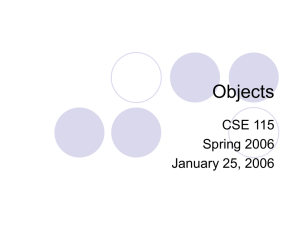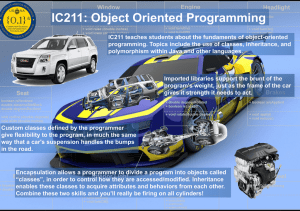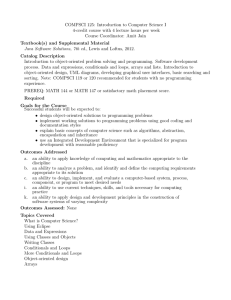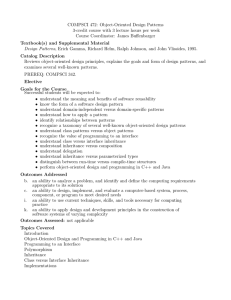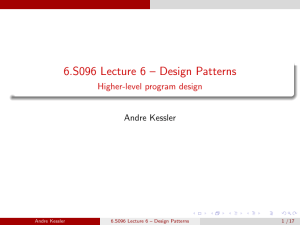Lecture 5 – Object-Oriented C++ 6.S096 Inheritance, STL Abstraction,
advertisement
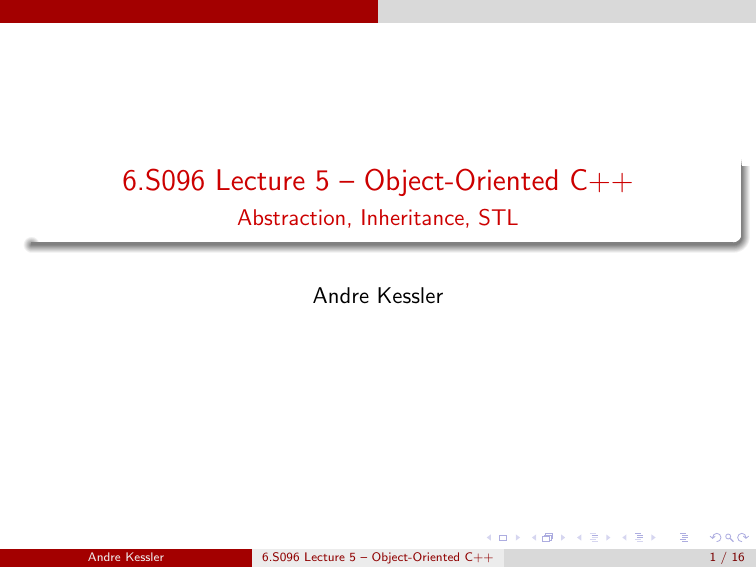
6.S096 Lecture 5 – Object-Oriented C++
Abstraction, Inheritance, STL
Andre Kessler
Andre Kessler
6.S096 Lecture 5 – Object-Oriented C++
1 / 16
Outline
1
Assignment 2
2
Crash course in the STL
3
Inheritance
4
Pitfalls
Andre Kessler
6.S096 Lecture 5 – Object-Oriented C++
2 / 16
Assignment 2
Assignment 2
Linked list library (list)
Writing linked list code that other programs can use
No memory leaks!
Minimum spanning tree (mst)
Using the STL
Implementing an algorithm
Writing fast C++
Rational numbers library (rational)
Overloading arithmetic functions
Edge cases
Exceptions
Andre Kessler
6.S096 Lecture 5 – Object-Oriented C++
3 / 16
Crash course in the STL
Crash course in the STL
<vector>
Remember the Array class we were writing last time? A better version
already exists in C++, so we don’t need to write it ourselves!
#include <vector>
// In our code:
std::vector<int> intArray;
while( /* getting data */ ) {
intArray.push_back( data );
}
int tenthItem = intArray[9]; // like an array
// Automatically destroys data when done
The angle brackets < and > let us specialize this type: we can replace T
with any other type T, like std::vector<T>.
Andre Kessler
6.S096 Lecture 5 – Object-Oriented C++
4 / 16
Crash course in the STL
Crash course in the STL
STL? What’s that?
STL stands for Standard Template Library. Containers and algorithms to
use on those containers, all with a common interface. Another vector:
#include <vector>
#include <string>
// In our code:
std::vector<std::string> stringList;
stringList.push_back( "C99" );
stringList.push_back( "C++03" );
stringList.push_back( "C++11" );
for( auto str : stringList ) { // "range-for"
std::cout << str << "\n"
\n";
}
Andre Kessler
6.S096 Lecture 5 – Object-Oriented C++
5 / 16
Inheritance
Some (BAD!) code that needs to be refactored
We’ve got a struct to hold some shape data for different ShapeTypes.
// BAD CODE!
enum ShapeType { CIRCLE = 0, SQUARE = 1,
RECTANGLE = 2, TRIANGLE = 3 };
// needs to be big enough to hold the shape
struct Shape {
ShapeType type;
double a, b, c, d;
};
And we want a function to compute the area, given a shape.
Andre Kessler
6.S096 Lecture 5 – Object-Oriented C++
6 / 16
Inheritance
Some (BAD!) code that needs to be refactored
Without some good object-oriented practices, code like this can become a
tangled mess of switch or if/else statements.
// BAD CODE!
double area( const Shape &shape ) {
switch( shape.type ) {
case CIRCLE: return M_PI * shape.a * shape.a;
case SQUARE: return shape.a * shape.a;
case RECTANGLE: return shape.a * shape.b;
case TRIANGLE: return 0.5 * shape.a * shape.b;
default: std::cerr << "Error, invalid shape!\n"
\n";
}
return 0.0;
}
Andre Kessler
6.S096 Lecture 5 – Object-Oriented C++
7 / 16
Inheritance
What’s so bad?
Any time we want to make a function that works
differently on different types of shapes, we need
this same switch statement.
Lots of code repetition.
The member variable names do not describe their
purpose.
Not extensible: when we add a new shape, we have
to modify every one of these functions.
Andre Kessler
6.S096 Lecture 5 – Object-Oriented C++
8 / 16
Inheritance
Our refactoring: an abstract class
Let’s create an abstract class Shape. We do this by giving the class
some virtual functions; these are functions which child classes can
override.
Could have member variables or not (in this case, we won’t)
Pure virtual functions (the = 0).
Notice the destructor is virtual.
class Shape {
public:
virtual double area() const = 0; //pure virtual
virtual ~Shape() {}
};
Andre Kessler
6.S096 Lecture 5 – Object-Oriented C++
9 / 16
Inheritance
Inheritance
class Shape {
public:
virtual double area() const = 0; //pure virtual
virtual ~Shape() {}
};
class Circle : public Shape {
double _radius;
public:
Circle( double theRadius ) : _radius{theRadius} {}
~Circle() {}
inline double radius() const { return _radius; }
double area() const { return
_radius * _radius * M_PI; }
};
Andre Kessler
6.S096 Lecture 5 – Object-Oriented C++
10 / 16
Inheritance
Closer look at the child class...
Syntax is class Derived : public Base
class Circle : public Shape {
double _radius;
public:
Circle( double theRadius ) : _radius{theRadius} {}
~Circle() {}
inline double radius() const { return _radius; }
double area() const { return
_radius * _radius * M_PI; }
};
Andre Kessler
6.S096 Lecture 5 – Object-Oriented C++
11 / 16
Pitfalls
Know the functions C++ automatically creates!
Looks like a pretty emtpy class, right?
class Empty{};
Andre Kessler
6.S096 Lecture 5 – Object-Oriented C++
12 / 16
Pitfalls
Know the functions C++ automatically creates!
Looks like a pretty emtpy class, right? Wrong!
class Empty{
public:
Empty() { /*...*/ } // constructor
// copy constructor
Empty( const Empty &rhs ) { /*...*/ }
// copy assignment
Empty& operator=( const Empty& rhs ) { /*...*/ }
~Empty() { /*...*/ } // destructor
};
If we don’t want these functions, have to disallow by making them private
and indicating = delete!
Andre Kessler
6.S096 Lecture 5 – Object-Oriented C++
13 / 16
Pitfalls
Examples
Some other tips from Scott Meyers:
Item 7: Declare destructors virtual in polymorphic classes.
Item 10: Have assignment operators return a reference to *this.
Item 12: Copy all parts of an object.
Item 22: Declare data members private
Item 32: Make sure public inheritance models “is-a”.
Read his book, Effective C++!
Andre Kessler
6.S096 Lecture 5 – Object-Oriented C++
14 / 16
Pitfalls
Examples
Let’s see some examples...
Andre Kessler
6.S096 Lecture 5 – Object-Oriented C++
15 / 16
Pitfalls
Wrap-up & Wednesday
Monday is a holiday!
Second assignment due Weds. at midnight
Class on Weds.
Design patterns and anti-patterns
Questions?
Office hours Mon, Tues in 26-142
Andre Kessler
6.S096 Lecture 5 – Object-Oriented C++
16 / 16
MIT OpenCourseWare
http://ocw.mit.edu
6(IIHFWLYH3URJUDPPLQJLQ&DQG&
,$3
For information about citing these materials or our Terms of Use, visit: http://ocw.mit.edu/terms.


